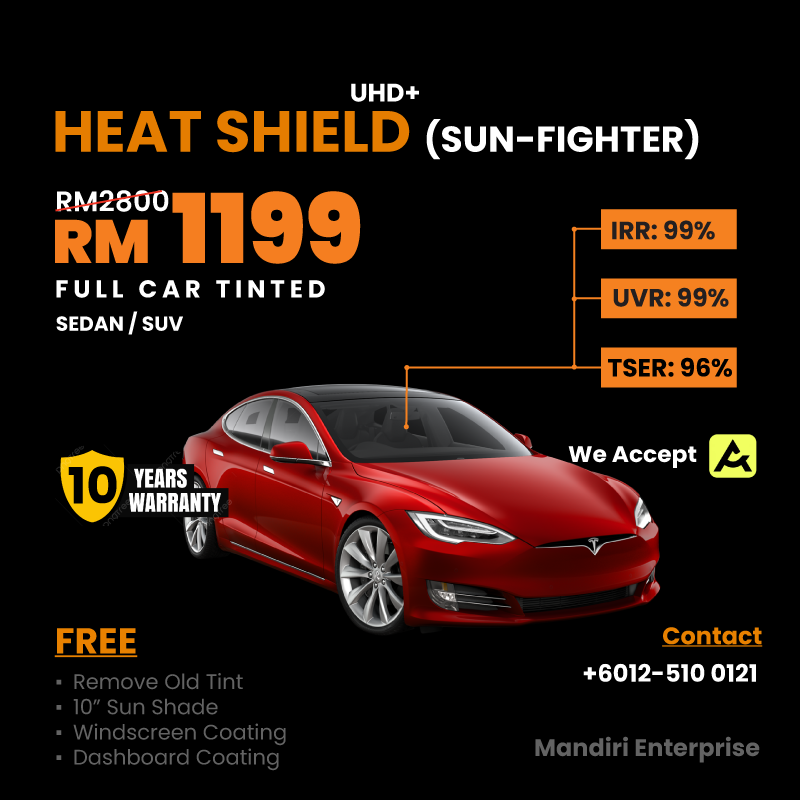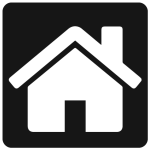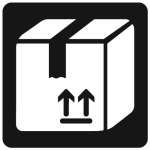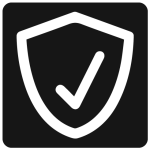Heat Shield™ — Graphene + Titanium Hybrid Window Film
Heat Shield™ — Graphene + Titanium Hybrid Window Film
Heat Shield™ is the pinnacle of window film technology, crafted using an advanced hybrid composition of Graphene and Titanium — two of the strongest, most heat-resistant materials known to science. This next-generation tint delivers maximum comfort, unparalleled heat rejection, and long-lasting protection for your vehicle, home, or commercial space.
Why Choose Heat Shield™?
✅ Ultimate Heat Rejection:
-
Blocks up to 99% Infrared Radiation (IRR)
-
Total Solar Energy Rejection (TSER) of 96%
-
Reduces cabin temperatures dramatically for unmatched comfort
✅ UV Protection:
-
Blocks 99% of Harmful UV Rays (UVR)
-
Protects skin, eyes, and interior materials from fading, cracking, and aging
✅ Graphene Strength & Clarity:
-
Graphene-infused layer provides superior structural integrity
-
Ultra-thin yet stronger than steel — ensures crystal-clear optical clarity
✅ Titanium Durability:
-
Titanium layer enhances heat reflection and film longevity
-
Corrosion-resistant, fade-proof, engineered to last over 10 years
✅ Ceramic & Sputter Fusion Technology:
-
Combines the best of Ceramic and Sputter techniques
-
Delivers high heat rejection without compromising visibility
✅ Enhanced Privacy & Glare Reduction:
-
Optional shades offer increased privacy
-
Reduces glare for safer, more comfortable driving
Why Heat Shield™ is the Best Choice
🌐 World-Class Raw Materials:
-
Graphene: Ultra-lightweight, 200x stronger than steel, excellent thermal conductivity
-
Titanium: Aerospace-grade toughness, corrosion-resistant, high reflectivity
🚗 Vehicle Comfort & Protection:
-
Keeps interiors significantly cooler
-
Extends lifespan of dashboards, leather seats, and electronics
-
Reduces fuel consumption by minimizing air-conditioner usage
💎 Premium Appearance:
-
Sleek, modern finish that complements luxury vehicles
-
No interference with GPS, mobile signals, or smart sensors
🔒 Lifetime Peace of Mind:
-
Backed by a 10+ Year Warranty
-
Engineered to outperform conventional tints in the harshest climates
Heat Shield™ — Protection Reinvented
Whether you demand cutting-edge technology, premium aesthetics, or maximum heat defense, Heat Shield™ is engineered for those who settle for nothing less than the best.
Protect What Matters — Choose Heat Shield™.
IRR or Infrared Ray Rejection Value : 99%
The infrared (IR) rejection rate of Heat Shield™ UHD tint is 99% (It’s never been lower than 99%).
Infrared Rejection (IRR) by VLT Grade
| VLT (Visible Light Transmission) | IRR (Infrared Rejection) | Tolerance |
|---|---|---|
| 5% (Limo Black) | 99% | NO |
| 15% (Dark Smoke) | 99% | NO |
| 35% (Medium Smoke) | 99% | NO |
| 50% (Light Smoke) | 99% | NO |
| 70% (High Clarity) | 99% | NO |
UVR or Ultraviolet Rejection Value : 99%
The ultraviolet (UVR) rejection rate of Heat Shield™ UHD tint is 99%. Even darkness is different but UVR is same 99% or more
UV Rejection Performance
| VLT Grade | Visible Light Transmission | UV Rejection (UVR) |
|---|---|---|
| 05% | Limo Darkness | 99%+ |
| 15% | Dark Smoke | 99%+ |
| 35% | Medium Smoke | 99%+ |
| 50% | Light Smoke | 99%+ |
| 70% | High Clarity | 99%+ |
Key Features:
✅ Consistent 99%+ UV Block – Regardless of tint darkness
✅ Full Spectrum Protection – Blocks both UVA (315-400nm) and UVB (280-315nm)
✅ Non-Negotiable Safety – Meets international skin cancer prevention standards
VLT or Visible Light Transmission / Darkness
VLT or visible light transmission mean the percentage of light can go throw the tint. VLT is opposite of darkness. Example; if VLT is 05%, the darkness will be 95%
What VLT Means:
VLT = % of visible light (380-700nm) that passes through the tint
-
Lower VLT = Darker tint (more light blocked)
-
Higher VLT = Lighter tint (more light transmitted)
Product’s VLT Options:
| VLT % | Darkness % | Common Name | Best Use Cases |
|---|---|---|---|
| 5% | 95% | Limo Black | Maximum privacy, luxury vehicles |
| 15% | 85% | Dark Smoke | Privacy with some visibility |
| 35% | 65% | Medium Smoke | Balanced privacy/visibility |
| 50% | 50% | Light Smoke | UV/heat rejection + clarity |
| 70% | 30% | High Clarity | Maximum visibility + UV protection |
TSER or Total Solar Energy Rejection : 96%
TSER (Total Solar Energy Rejected) is a key performance metric for window films (including Multilayer Sputter UHD Tint) that measures the percentage of total solar energy (heat) blocked by the film. It accounts for:
-
Infrared (IR) Rejection
-
UV Rejection
-
Visible Light Absorption/Reflection
Formula:
TSER = (Reflected Solar Energy + Absorbed Solar Energy) ÷ Total Incident Solar Energy
Why It Matters:
-
A higher TSER (%) means better heat reduction.
-
Example: A film with 96% TSER rejects 96% of the sun’s heat energy.
-
Differs from IR rejection (which only measures infrared heat).
Typical TSER Values:
-
Standard dyed films: 30–50% TSER
-
Metallized/Ceramic films (e.g., Heat Shield™ UHD): 96%+ TSER
Key Note:
TSER depends on the film’s VLT (Visible Light Transmission). Darker films (lower VLT) usually have higher TSER but reduce natural light.
Thickness : 2mil
Our Heat Shield™ Window Tint Film is engineered with advanced 2mil thickness (50.8 microns) for superior durability, crystal-clear clarity, and world-class heat rejection. Powered by Graphene, Titanium, and Nano Ceramic technology, Heat Shield™ delivers ultimate comfort, maximum solar protection, and exceptional longevity.
Looking for added security?
Upgrade to our premium Heat Shield™ + Safety Tint Package — combining superior heat rejection with an additional protective layer for enhanced safety, security, and impact resistance.
Warranty Terms for Heat Shield™ Tint
Coverage Period:
✅ 10 Years – Comprehensive protection for defects and performance.
What’s Covered:
-
Manufacturing Defects:
-
Bubbling, peeling, or delamination.
-
Cracking
-
-
Aesthetic Integrity:
-
Color fade/discoloration beyond acceptable standards.
-
Hazing or loss of optical clarity.
-
Performance Warranty:
-
Infrared Rejection (IRR) & UV Rejection (UVR):
-
Guaranteed to maintain minimum 90% of original performance (e.g., 90% UVR → remains ≥81%).
-
10% tolerance allowed for batch variations and testing methods.
-
What’s Not Covered:
-
Damage from glass breakage, or aftermarket cleaning chemicals.





